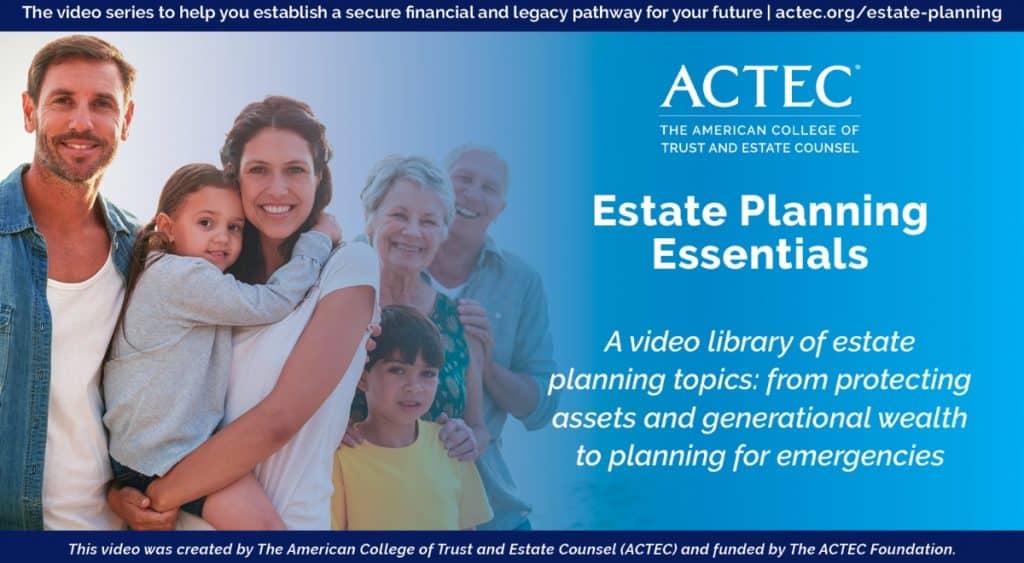After the death of a loved one, survivors want to know, when will I receive my inheritance? What happens to a person’s assets after they pass away? What if a person dies without a will?
ACTEC Fellows Jean Gordon Carter and Kerri L.S. Mast answer these questions, explain how inheritance and estate settlement work, and what to keep in mind when you have been identified as a beneficiary in a will or trust.
Transcript
I’m Jean Carter an ACTEC Fellow from Raleigh, North Carolina, and I have with me Kerri Mast, an ACTEC Fellow from Charlotte, North Carolina. Our topic today is estate settlement or “dad just died – when do I get my money?” Kerri, let’s start at the beginning. What is a state settlement or estate administration?
Estate administration is a legal process to settle the affairs of a person who passed away. Through this process, their debts are settled, and their assets are distributed. There may be other matters to resolve as well, such as who gets custody of their minor children.
What are the steps in the estate administration process?
Kerri Mast: There are a number of steps involved with estate administration. First, someone has to be appointed as executor. That’s the person who can represent the estate and who can take action and make decisions with respect to the estate. The executor is in charge of taking inventory of all the assets; figuring out what the person owned when they died. This can be difficult because for so many assets, like investment accounts, we don’t even get paper statements anymore. We just have online access. It’s really helpful if the decedent kept good records so we know where to look for those assets. There also can be assets in a lockbox at a bank, in a home safe, or even hidden in places around the home. So you really have to take careful inventory. Before the executor can distribute assets out to the family, the debts of the person who died have to be paid off. This includes things like paying credit card bills or for somebody who had a last illness, paying the hospital bill. Once the creditors are paid, the executor has a responsibility to distribute the assets in accordance with the estate’s beneficiaries.
Jean Carter: This is a family matter. Why is the court involved at all?
Kerri Mast: For many people, it is a family matter. But as you well know Jean, even among families, disputes can arise as you’re trying to settle the estate of a loved one. And there are other parties, such as creditors, who might have an interest in the estate. The estate administration process is designed to settle an estate in a way that’s fair to everyone.
Jean Carter: Can we avoid court involvement?
Kerri Mast: It may be possible. If someone owns assets in their individual name though, the court likely will need to be involved. But, if assets are owned by a revocable trust or a living trust, the court may not need to be involved with those assets. That’s the case as well for assets that are controlled by beneficiary designation form, such a 401(k)s, IRAs, or life insurance. The court does not need to be involved with those.
Jean Carter: Dad had a will. Does that matter?
Kerri Mast: Absolutely. Dad’s will controls those assets that are held in his individual name. But for assets like IRAs, 401(k)s, and life insurance, his will does not control the distribution of those assets. For any assets that are held in a revocable trust or a living trust, his will does not control those assets either.
Jean Carter: I’ve heard people say that if Dad doesn’t have a will, everything just goes to the state.
Kerri Mast: Jean, this is an important question and reflects a common misconception. Many people believe that if dad doesn’t have a will, it just reverts back to the state. That’s simply not true. The property does not go back to the state. So, what happens? We have a saying, “if you don’t have a will, the state you reside in has one for you.” Every state has a statute that contains default provisions regarding how your assets will be distributed if you don’t have a will. In other words, your state makes its best guess regarding how you would want your property distributed.
Jean Carter: How much does it cost to settle an estate?
Kerri Mast: There is such a range regarding the cost of estate administration. Complex estates cost more to settle than simple estates; and corporate executors, such as a bank, often cost more than if you name an individual executor, like your sibling. In addition, the steps that we’ve talked about today have to be taken, regardless of the size of the estate. So, there can be a lot of variation in the cost of estate administration.
Jean Carter: Okay. How long does it take to settle an estate?
Kerri Mast: There is a range regarding how long it takes to settle an estate and several factors at play, including the asset value and complexity. Simple estates might be settled within six months. Complex estates, those with a lot of assets or assets that are complex or hard to value can take several years to settle. If an estate tax return is required, the estate might not be closed until the IRS indicates its acceptance of the estate tax return. That can take more than two years from the date the person died. And, if there are any disputes relating to the estate because of a dynamic within the family, because of a dispute with a creditor, because the IRS has a question about the estate tax return, it can take even longer.
Jean Carter: Okay. Let’s go through to what counts. When do I get my money?
Kerri Mast: That is the million-dollar question, Jean; and I’ll give you the only answer a lawyer can give, which is, “it depends.” If you are getting a specific bequest, a certain amount of money, the executor might be able to distribute that to you right after creditors are paid. But, if you are getting a residual bequest – the money that’s leftover at the end of estate administration – the executor has to wait to pay you until the creditors are paid and the specific bequests are paid out. If an estate tax return is required, the executor likely will not make a final distribution to you until the estate is closed. As a practical matter, I encourage executors and estate beneficiaries to be in communication with one another to establish clear expectations regarding when they can expect their money.
Jean Carter: Thank you. Kerri, this is a very important topic. We really appreciate your insights today. Thank you.
Kerri Mast: Thank you, Jean.
Featured Video
How to Talk With Your Parents About Estate Planning
Trust and estate lawyers offer recommendations for how to have critical conversations with your parents about end-of-life planning and estate documents.
ACTEC Estate Planning Essentials

ACTEC Fellows provide answers to frequently asked trust and estate planning questions in this video series.



